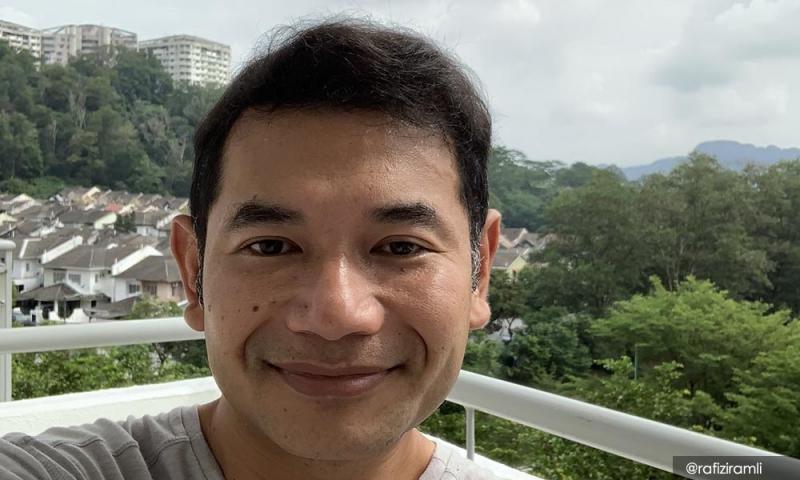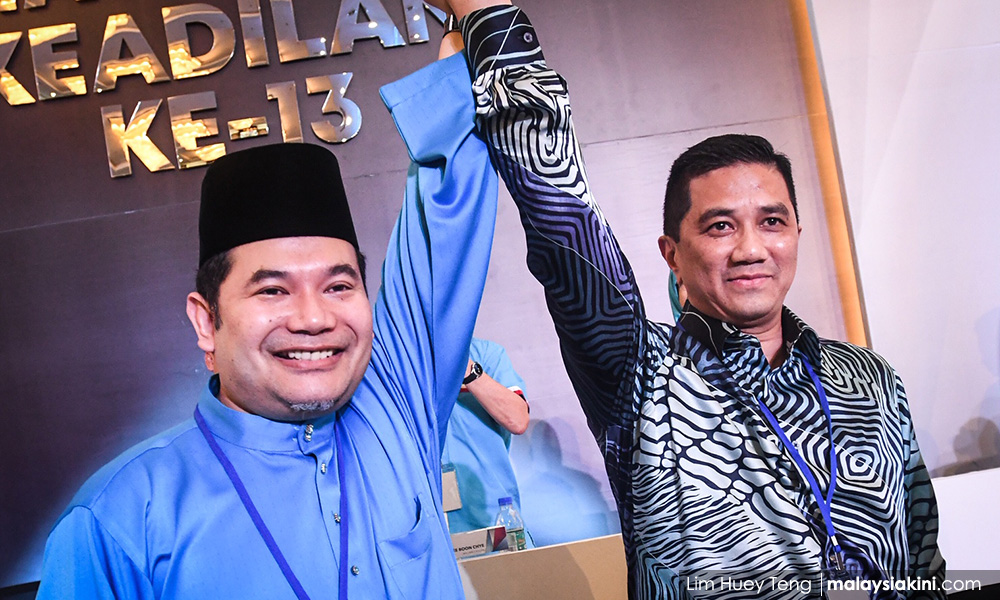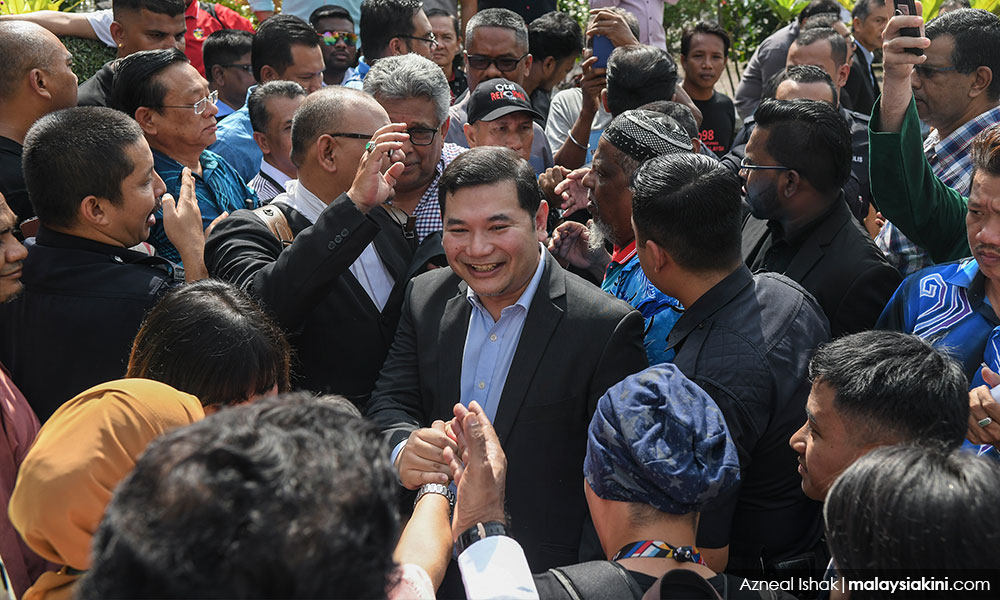
S Thayaparan
“No, sir, I'm afraid not, no sir. I yielded the floor once before, if you can remember, and I was practically never heard of again. No sir. And we might as well all get together on this yielding business right off the bat, now.”
COMMENT | Rafizi Ramil has chosen to reenter the political fray when PKR’s stock is at its lowest.
PKR, often described as the weak link in Pakatan Harapan, has not only suffered electoral setbacks but is considered a party incapable of leadership because the prime minister in perpetual waiting, Anwar Ibrahim, has made moves that have not only destabilised his party but also threatened the viability of the coalition he supposedly leads.
In his posting about his return to active political life, Rafizi made it clear he wants to stake out the multiethnic middle ground. What this means remains to be seen, especially since the political dynamic of the various political parties in Harapan adhere to the old Umno/BN formula which Harapan (especially the DAP) always downplays with the Bangsa Malaysia kool-aid.
Rafizi has already fired his opening salvo, eliciting various responses from various groups within Harapan, about teaming up with Perikatan Nasional for the next election, which he described as “madness”.
Huddling together like frightened children is not a new electoral strategy. It is as though Harapan was never confident in its ability to galvanise a majority of the electorate for political power.
The first time Rafizi went for the number two post in PKR (which he lost) in 2018, he said this of the supposed big tent strategy.
“In the last two or three years, PKR has had a disagreement about how we would move forward to face GE14. One school of thought, which is identified with me, believed that we must strengthen Harapan by remaining true to our ideals of a multiracial party.
“The other school of thought is associated with Azmin Ali and his team - Zuraida (Kamaruddin), S Sivarasa and Tian Chua - that we must avoid three-cornered fights and it is important to get closer to the so-called Malay axis. That PKR had to move closer to PAS and away from Harapan.
“These schools of thought brought contention in the party. But instead of breaking PKR, what happened after GE14 is PKR got stronger and we all focused on our areas of expertise.”
Well, we all know how that ended, right?
Azmin vs Rafizi
Back in the day someone once asked me who do I prefer, Azmin or Rafizi?
I said, in a perfect world, they would be working together. Both have demonstrated a remarkable ability to remain relevant and contribute to Malay politics in a way that is - unfortunately - essential in running this country. Azmin plays it close to his chest, while Rafizi puts it out there.
“No, sir, I'm afraid not, no sir. I yielded the floor once before, if you can remember, and I was practically never heard of again. No sir. And we might as well all get together on this yielding business right off the bat, now.”
– Mr Smith Goes to Washington
COMMENT | Rafizi Ramil has chosen to reenter the political fray when PKR’s stock is at its lowest.
PKR, often described as the weak link in Pakatan Harapan, has not only suffered electoral setbacks but is considered a party incapable of leadership because the prime minister in perpetual waiting, Anwar Ibrahim, has made moves that have not only destabilised his party but also threatened the viability of the coalition he supposedly leads.
In his posting about his return to active political life, Rafizi made it clear he wants to stake out the multiethnic middle ground. What this means remains to be seen, especially since the political dynamic of the various political parties in Harapan adhere to the old Umno/BN formula which Harapan (especially the DAP) always downplays with the Bangsa Malaysia kool-aid.
Rafizi has already fired his opening salvo, eliciting various responses from various groups within Harapan, about teaming up with Perikatan Nasional for the next election, which he described as “madness”.
Huddling together like frightened children is not a new electoral strategy. It is as though Harapan was never confident in its ability to galvanise a majority of the electorate for political power.
The first time Rafizi went for the number two post in PKR (which he lost) in 2018, he said this of the supposed big tent strategy.
“In the last two or three years, PKR has had a disagreement about how we would move forward to face GE14. One school of thought, which is identified with me, believed that we must strengthen Harapan by remaining true to our ideals of a multiracial party.
“The other school of thought is associated with Azmin Ali and his team - Zuraida (Kamaruddin), S Sivarasa and Tian Chua - that we must avoid three-cornered fights and it is important to get closer to the so-called Malay axis. That PKR had to move closer to PAS and away from Harapan.
“These schools of thought brought contention in the party. But instead of breaking PKR, what happened after GE14 is PKR got stronger and we all focused on our areas of expertise.”
Well, we all know how that ended, right?
Azmin vs Rafizi
Back in the day someone once asked me who do I prefer, Azmin or Rafizi?
I said, in a perfect world, they would be working together. Both have demonstrated a remarkable ability to remain relevant and contribute to Malay politics in a way that is - unfortunately - essential in running this country. Azmin plays it close to his chest, while Rafizi puts it out there.

Rafizi Ramli and Azmin Ali at PKR congress in 2018
Not many people like it when I say that Azmin’s sin was not that he wanted to supplant Anwar - if Anwar could not hold on to his power that's on him - but rather he went outside the PKR family to gain power. You never go outside the family.
I get that Rafizi is beloved by progressive Malays and non-Malays but the question remains, will his “school of thought” resonate with the majority Malays which he needs to court for electoral victory?
More importantly, how would this translate when it comes to his belief in the multiethnic middle-ground politic? To this, we should add that when Rafizi criticises PKR, it is welcomed with open arms, but supposing he is critical of the DAP, then what happens?
We have seen how DAP and its base does not accept criticism well, and if there is blowback, then this will turn into a racial issue and propagandists in the Malay establishment will use it as just another example of how nobody can work with the “Chinese DAP”.
Furthermore, how is Rafizi, especially in a position of influence, going to counter the religiosity and racism of the Malay establishment under the guise of Malay rights? How would he balance needed reform and the corruption of entitlement programmes while adhering to an egalitarian framework?
This is important because if he destabilises PKR, it would just further erode the political party as a viable option for the Malay community.
Grassroots level politics and issues are far removed from national issues and if Rafizi can balance his multiethnic agenda with all politics being local, this would indeed be an impressive feat. More importantly, he needs support within PKR to maintain this balance and already the knives are out and the various power groups within PKR are plotting their next move.
Rafizi does understand the problems faced by the Malay community and the failure of Harapan. In 2017, in a roundtable discussion, his words sound prophetic: “We don’t understand that Malay voters need more than just talk. Telling people that Najib is going to bring us down is not enough.
“Why do we lack credibility? We have been out of touch, to the point of being condescending.
“We just have to convince the people enough that we can do a better job. We must honestly accept failings and offer solutions that may be controversial.”
When Rafizi said, “So, if they (Malays) were to choose, they would rather choose someone they can trust. If we were to change from one product to another, we want to be sure the substitute of the product can bring better value to you,” this is something that I have been going on about for years, which is there is no real alternative in what Harapan is offering, so why not choose the original?
Controversial strategies needed
Therein lies the problem. Harapan needs controversial strategies - in the Malaysian context that is - but will Rafizi be able to convince PKR and the grassroots that controversial is the way to go, especially in this political terrain where former prime minister Najib Abdul Razak and Co have demonstrated that they can win elections even though they lead as the court cluster?
Not many people like it when I say that Azmin’s sin was not that he wanted to supplant Anwar - if Anwar could not hold on to his power that's on him - but rather he went outside the PKR family to gain power. You never go outside the family.
I get that Rafizi is beloved by progressive Malays and non-Malays but the question remains, will his “school of thought” resonate with the majority Malays which he needs to court for electoral victory?
More importantly, how would this translate when it comes to his belief in the multiethnic middle-ground politic? To this, we should add that when Rafizi criticises PKR, it is welcomed with open arms, but supposing he is critical of the DAP, then what happens?
We have seen how DAP and its base does not accept criticism well, and if there is blowback, then this will turn into a racial issue and propagandists in the Malay establishment will use it as just another example of how nobody can work with the “Chinese DAP”.
Furthermore, how is Rafizi, especially in a position of influence, going to counter the religiosity and racism of the Malay establishment under the guise of Malay rights? How would he balance needed reform and the corruption of entitlement programmes while adhering to an egalitarian framework?
This is important because if he destabilises PKR, it would just further erode the political party as a viable option for the Malay community.
Grassroots level politics and issues are far removed from national issues and if Rafizi can balance his multiethnic agenda with all politics being local, this would indeed be an impressive feat. More importantly, he needs support within PKR to maintain this balance and already the knives are out and the various power groups within PKR are plotting their next move.
Rafizi does understand the problems faced by the Malay community and the failure of Harapan. In 2017, in a roundtable discussion, his words sound prophetic: “We don’t understand that Malay voters need more than just talk. Telling people that Najib is going to bring us down is not enough.
“Why do we lack credibility? We have been out of touch, to the point of being condescending.
“We just have to convince the people enough that we can do a better job. We must honestly accept failings and offer solutions that may be controversial.”
When Rafizi said, “So, if they (Malays) were to choose, they would rather choose someone they can trust. If we were to change from one product to another, we want to be sure the substitute of the product can bring better value to you,” this is something that I have been going on about for years, which is there is no real alternative in what Harapan is offering, so why not choose the original?
Controversial strategies needed
Therein lies the problem. Harapan needs controversial strategies - in the Malaysian context that is - but will Rafizi be able to convince PKR and the grassroots that controversial is the way to go, especially in this political terrain where former prime minister Najib Abdul Razak and Co have demonstrated that they can win elections even though they lead as the court cluster?

Rafizi Ramli in court in 2019
Rafizi not only has to contend with desperate power players within his own party, but he also needs to consider elements in the DAP and Amanah who have agendas of their own.
Rafizi’s return is not about policy. Not yet anyway. It is about how he can navigate the political terrain of Harapan and remember he failed the last time.
Is the situation different now that Azmin and his base are not around? I have no doubt that Azmin still has allies within PKR and all these strategies which Rafizi rightly deemed “madness” are being pushed by loyalists who have the ear of Anwar. I could be wrong but there are many more Grima Wormtongues in PKR than there are Eowyns.
Are some people pinning their hopes on one man? That is a good question which is certainly a lot more complicated than it sounds. The reality is that political parties either coalesce around a galvanising idea or individual. In Malaysian politics, it is the strongman-type leader which is often what the electorate grabs onto.
Rafizi is right about personality politics, but his big ideas depend on the political brand he creates and how he manages to manoeuvre in the treacherous world of PKR politics. You need a strong personality to do that, especially since you have a generation of young leaders who want to “inherit” from their elders instead of taking over and establishing a political agenda of their own.
Rafizi's contention that he does not want to rock the boat by not gunning for the top job is unconvincing. As is his contention that it is not important who leads the party.
This does not mean that I think that Rafizi should be gunning for the top spot, only that playing it safe when PKR desperately needs leadership is politics as usual for PKR, which is something I assumed Rafizi was rightfully trying to subvert.
Rafizi cannot be all things to all people. It remains to be seen if he can be a unifying and reformative force in PKR and not just a disruptive one.
Rafizi not only has to contend with desperate power players within his own party, but he also needs to consider elements in the DAP and Amanah who have agendas of their own.
Rafizi’s return is not about policy. Not yet anyway. It is about how he can navigate the political terrain of Harapan and remember he failed the last time.
Is the situation different now that Azmin and his base are not around? I have no doubt that Azmin still has allies within PKR and all these strategies which Rafizi rightly deemed “madness” are being pushed by loyalists who have the ear of Anwar. I could be wrong but there are many more Grima Wormtongues in PKR than there are Eowyns.
Are some people pinning their hopes on one man? That is a good question which is certainly a lot more complicated than it sounds. The reality is that political parties either coalesce around a galvanising idea or individual. In Malaysian politics, it is the strongman-type leader which is often what the electorate grabs onto.
Rafizi is right about personality politics, but his big ideas depend on the political brand he creates and how he manages to manoeuvre in the treacherous world of PKR politics. You need a strong personality to do that, especially since you have a generation of young leaders who want to “inherit” from their elders instead of taking over and establishing a political agenda of their own.
Rafizi's contention that he does not want to rock the boat by not gunning for the top job is unconvincing. As is his contention that it is not important who leads the party.
This does not mean that I think that Rafizi should be gunning for the top spot, only that playing it safe when PKR desperately needs leadership is politics as usual for PKR, which is something I assumed Rafizi was rightfully trying to subvert.
Rafizi cannot be all things to all people. It remains to be seen if he can be a unifying and reformative force in PKR and not just a disruptive one.
S THAYAPARAN is Commander (Rtd) of the Royal Malaysian Navy. Fīat jūstitia ruat cælum - “Let justice be done though the heavens fall.”

Politics should not be overly focused on Personality politics, but... good leadership is indispensable.
ReplyDeleteAll successful political movements have been the result of good ideas being translated into support and action by great leaders.
And good political leadership is not about just following what the majority currently wants or thinks it wants.
It is about convincing the majority to follow the right path to succeed, based on values and principles.
Even if the majority does not currently subscribe to it.